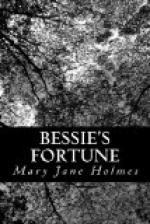Next to Neil was the three-year old Robin, with blue eyes and golden hair, like the blind Robin for whom he was named, and next was the girl baby, who came nearly a year and a half ago, and to whom Grey said, when he first took her in his arms:
“I thank God for giving you to me my little daughter, and I am sure you look just as your mother did when she first opened her eyes at Stoneleigh. Yes, I am very glad for you, little Bessie McPherson.”
And so that was the name they gave the baby with lustrous blue eyes and wavy hair, and the same sweet, patient expression about the mouth as there was about the mouth of the young girl-mother, whom Neil and Robin called “Bessie mamma,” while to their sister they gave the name of “Baby Bessie.”
And Baby Bessie was in the roomy carriage, sitting on Jenny’s lap, and playing peek-a-boo with Robin, while Neil stood on the opposite seat engaged in a hot altercation with another boy about his own age, who, dressed in deep black, which gave him a peculiar look, was seated at a little distance in a most elegant carriage, with servants in livery, and who, when asked by some one standing near what his name was, had answered:
“I am Lord Rossiter Hardy, and I am waiting for my mother, who is coming from New York, and who is going to bring me a bicycle.”
Something in the boy’s tone of superiority irritated Neil, who was thoroughly democratic, and he called out:
“Phoo!—a lord—why you are nobody but Ross Hardy! and your grandmother—”
“Hush, Neil, or I’ll tell your father; and look where you are standin’, with your dirthy fate on the cushions. Come down directly, or I’ll be afther helpin’ ye!” said Jennie; whereupon Neil turned his attention to her, and a spirited battle ensued, in which Robin also took part, and which was only brought to an end by the sound of the train in the distance.
“There’s the whistle! Out with ye, or ye’ll not be in time to grate yer uncle!” Jennie cried; and with a bound Neil was upon the ground, and rushing through the station, joined his mother, who with Grey was looking anxiously at the few passengers alighting from the train.
First came Lady Augusta Hardy, habited in the deepest of crape. Poor Teddie had died a few months before, and with her little son Rossiter, who was now the heir of Hardy Manor, she was spending the summer at home, and with her foreign airs and liveried servants brought from Dublin was creating quite a sensation to Allington. With a bow to the Jerrolds, who were among the few she condescended to notice, she passed on to where her coachman and footman waited for her, while Bessie ran hastily down the platform towards a tall, sickly looking man, who almost tottered as he walked, while a sudden pallor about his lips told how weak he was.
“Oh, Neil, I am so glad—and so sorry, too. I did not think you were like this,” Bessie cried, as she took both his hands in hers, and, standing on tiptoe, kissed the quivering lips, which could not for a moment speak to her “You are very tired,” she continued, as Grey came up and, after greeting the stranger cordially, offered him his arm.




